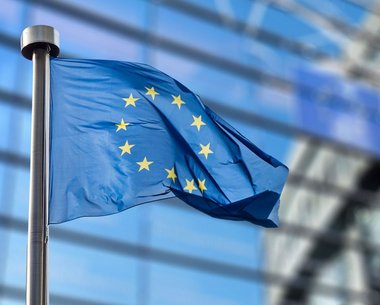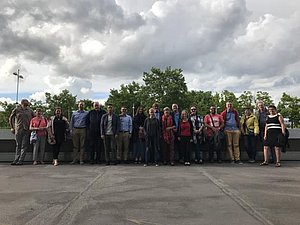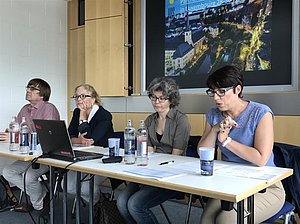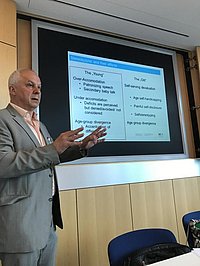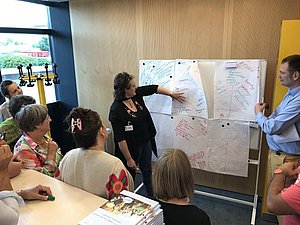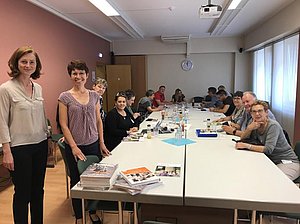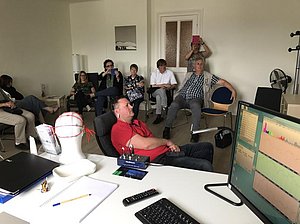2. Workshop in Luxemburg 28 to 30 June 2017
Silver Learners Partner Meeting in Luxemburg
The second Erasmus+ Silver Learners project meeting was hosted by the Gero-Center fir Altersfroen from June 28th- 30th in Luxembourg.
In total 25 project representatives from all six partner countries met at the Coque Conference Center in Luxembourg/Kirchberg to exchange about best-practice examples and discuss future challenges regarding Communication in the context of ageing: How to reach and teach the elderly?”
Day 1
After a warm welcome to all participants, Myriam Heirens, representative of the Ministry of Family and Integration, underlined the importance of good accessible low threshold education offers for elderly citizens. A special emphasis is placed on tackling the challenges of cultural diversity and language barriers of elderly migrants in Luxembourg (“culture sensitive offers”).
Kathleen Ludwig, study and programme administer at the university of Luxembourg, presented the concept and development of the Seniors Study programme at the University of Luxembourg that was initiated in 2011 in collaboration with RBS-Center fir Altersfroen. The programme aims at giving seniors an opportunity to either gain or refresh their academic knowledge on certain topics (around 80 courses). Senior students do not take exams nor acquire diplomas, but they are invited to attend the courses regularly and take an active part in the classes.
Subsequently, the director of the adult education department “, Chantal Fandel presented their service, which exists for 25 years. Their work is similar to the work of a “Volkshochschule” in Germany promoting lifelong learning, but here it is on a national level. She stated that silver learners are smart learners, that motivation is the best teacher, and that the adult education’s aim is to have smart offers to help people build new competences. These offers must respect all the different needs, putting all the learners in the middle and guiding them through their individual learning process. Carla Welter, manager of the EPALE-platform for Luxembourg presented the “Electronic Platform for Adult Learning in Europe” and invited all the partners with a professional role in adult learning across Europe to contact their local manager to participate on sharing their experiences.
The first day of the meeting ended with an introduction to the workshop by Laura Piron from RBS-Center fir Altersfroen, and “facts and figures” about demographic and socio-cultural specificities and their implications for reaching and teaching senior citizens in Luxembourg.
Sandy Lorente, Intercultural Agent of RBS – Center fir Altersfroen, presented a video about her pilot filed project in Esch-sur-Alzette “the intercultural walking group”. The project focuses on bringing together elderly people with different social and cultural backgrounds to participate in an activity - they probably would not share in another context - with the aim to promote diversity, social cohesion and open-minded exchange. The group meets on a weekly basis and in order to ease accessibility for everyone the participation in the group requires neither registration nor costs and the communication is based on a common language, i.e. French. This film was one of the highlights of the first day.
Day 2
The second day started with a keynote lecture given by Professor Dr. Dieter Ferring – Professor for developmental psychology and psychogerontology from the University of Luxembourg - who outlined basic concepts of communication and associated age-related changes over the lifespan. A special emphasis was put on the predicament and possible pitfalls of age stereotypes in social interactions: Based on a theoretical framework he explained how stereotyped expectations may change behavior towards elderly in ways we may not notice and correct. Another focal point of the keynote was set on the challenges, chances and concerns of the increasing digitalization (“digital divide”) in the context of ageing.
After that, representatives from Stockport, Iserlohn and Luxembourg presented their good-practice examples and shared their experiences related to specificities in communication and learning in the ageing context. Mark Perry, dementia development worker shared lessons learned from the EDUCATE Programme in Stockport that gives people with dementia “a voice” to through involvement in training or speaking to others about their experiences of having dementia. Frank Finkeldei, Programme administrator at Volkshochschule Iserlohn, discussed the implementation of “Moodle” courses for seniors as a complementary tool for adult education services. Simon Gross, director of the RBS-Center fir Altersfroen, explained that communication with “simple” people needs to be “simple”. He emphasized the importance of getting “in touch” with the elderly (i.e. join their perspective, acknowledge their learning biography, meet their needs) and choosing the right tools (“images sometimes are worth a thousand words”) in order to prepare the ground for more complex learning or training activities. The intercultural Agent of RBS-Center fir Altersfroen, Sandy Lorente, presented the card game “More than one Story”. The game achieves its purpose of building bridges between people in many contexts and is a practical method for integration, understanding, healthy curiosity and respect between people of all ages, backgrounds and cultures. Each card suggests a story which players can tell about themselves. Players take turns picking cards and then practice telling stories about themselves and listening to others telling their stories. The RBS Version of the game edited in 2014 is an adaptation of the original game for Luxembourg and the elderly. Its large format and clear readable font makes it suitable for elderly players. It is in four languages Luxembourgish, French, German and English. For further information, you can contact the Intercultural Agent of RBS: Sandy Lorente, lorente@rbs.lu.
After lunch all representatives were invited to participate in two interactive workshops:
A first working group was on “new digital technologies” proposed by Nyree Scott from Cambridgeshire Adult Learning and Skills. A second workshop was based on the “Silver Sharing Initiative” presented by the partners Joanna Szymanska and Bartlomiej Gluszak from FOSa Poland. Main goals of the workshops were to reflect on the “heterogeneity” of elderly learners by taking into account sociocultural and socioeconomic differences as well as technological innovations in different domains, which may impact social interaction, lifelong learning and mutual understanding in later life.
The second day ended with a steering group meeting for discussing the evolution and the progress of the project.
Day 3
On the third day the project representatives visited the RBS-Center fir Altersfroen in Itzig where collaborators of two different departments presented their specific fields of action. Jacqueline Orlewski and Nicole Duhr, project leaders in the RBS-Publications Department, presented the work they do in the area of biographical research and publishing.
They accompany and advise a group of senior citizens who write down their own memories and interview their contemporaries. These writings are edited, combined with photos and other historical documents, and then published in book form and on the specialized website www.memories.lu, set up by RBS for this purpose.
Afterwards participants visited the neurofeedback laboratory at RBS-Cellule de Recherche (www.cellulederecherche.lu).
Neurofeedback is a technique of a self-regulation in which current parameters of EEG brain activity recorded from the subject’s head are presented to a subject through real-time visual and auditory modality while the subject is supposed to alter these parameters to reach a more efficient mode of brain functioning. Martine Hoffmann, head of research and neurofeedback therapist, explained the fundamentals of neurotherapy, its possible training/therapeutic goals (e.g. optimize brain fitness, attention, emotional balance, stress-reduction) and illustrated the proceeding with a live demonstration in the lab.
The last day of the meeting ended with an optional guided city walk that gave participants the opportunity to discover the most beautiful sights of Luxembourg’s city center and old town.
Documents:
- The Seniors Studies Programme at the University of Luxembourg (PDF)
- RBS - Partner Meeting Silver Learners in Luxembourg (PDF)
- Communication in the Process and Context of Ageing (PDF)
- Best Practice on communication strategy...people with dementia as experts by experience (PDF)
- Blended Learning system for communication and learning (PDF)
- Communication methods and tools! (PDF)
- We are all "more than one story" (PDF)
- New Technologies and Digital learners workshop, Cambridgeshire Adult Learning & Skills (PDF)
- Silver Sharing - FOSa (PDF)
- Train your brain with Neurofeedback (PDF)


